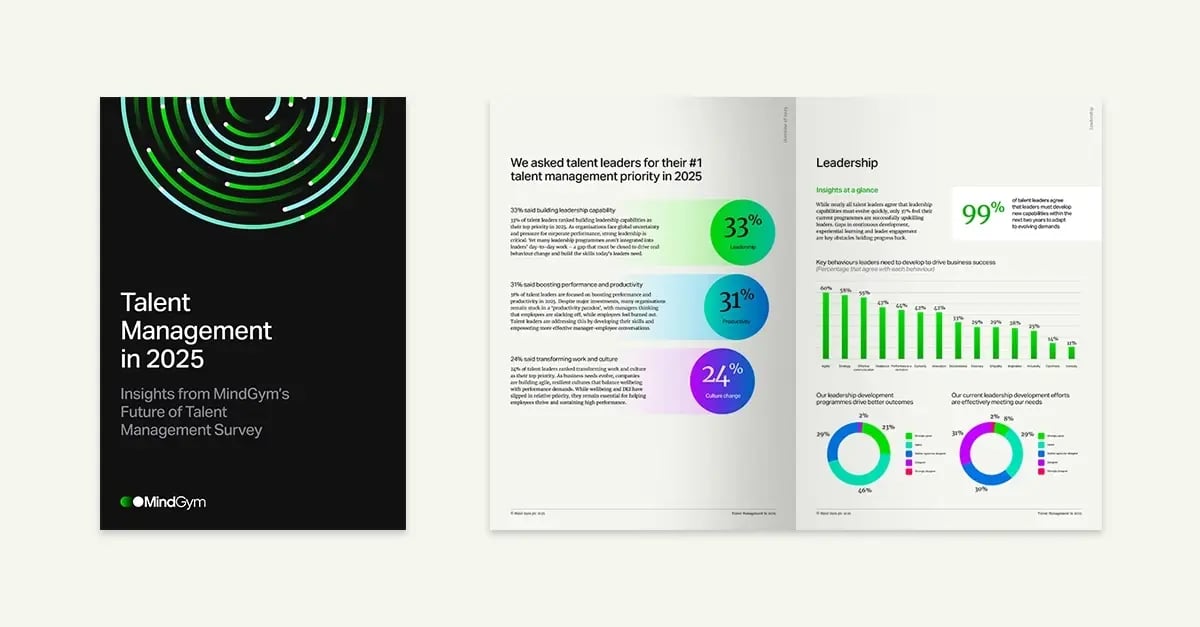- Thought leadership
- Research and insights
- 2025 talent management trends
Talent Management Trends in 2025
The plans, priorities and pivots of top talent leaders


Talent Management in 2025: What's in, what's out and what's next
2025 is shaping up to be the year of performance.
Talent leaders are facing a tough reality: expectations are rising, but teams are stretched, budgets are tight and capacity is limited. AI is often hailed as the solution. But the biggest opportunity for growth in 2025 isn't your technology - it's your people.
So where should talent leaders focus to move the needle?
We surveyed talent leaders across industries to understand how they're prioritising, adapting and delivering results with fewer resources. From rethinking leadership and unlocking skills, to rebalancing DEI and wrestling with AI, this report reveals the trends shaping talent strategies in 2025, and how the most forward-thinking organisations are staying ahead.
To help you take action, it also includes a practical diagnostic tool to pinpoint where to focus your efforts for the greatest impact.
The top 5 insights for 2025
have flat for reduced budgets
01 Doing more with (even) less
In 2025 talent leaders are being asked to deliver more with less. More than a quarter are seeing their budgets shrink, while nearly half report no change at all.
Yet the pressure keeps mounting. Business transformation, productivity and performance are now firmly in the spotlight, and talent teams are expected to be sharper, faster and more strategic than ever.
say that leadership development is a top-three priority
02 Leading the leaders
Leadership development has emerged as the number one priority for talent leaders in 2025. Highlighting how critical strong leadership will be for navigating the challenges ahead.
Yet making leadership development stick remains a persistent struggle. Too often, programmes are disconnected from the daily realities leaders face - and without continuous development, even the best initiatives lose momentum.
are moving towards a skills-based approach
03 Rethinking roles: A skills-based approach
The shift toward skills-based talent strategies is gaining serious momentum. Over half of organisations are actively moving away from traditional job-based models, instead focusing on the skills employees bring - and the skills they'll need next.
The goal is to better align talent with evolving business needs, boost career mobility and create a more agile, future-ready workforce. But making it real means overcoming big obstacles like outdated HR systems that aren't built for a skills-first world.
are exploring AI
04 The AI gap: Big hopes, slow moves
Everyone's talking about AI, but when it comes to Talent Management functions, adoption is still more ambition than action. Most leaders recognise AI's huge potential to personalise development and accelerate learning at scale.
However, concerns around data privacy, infrastructure and ethical use are holding many back.
agree that agility is a key leadership behaviour for business success
05 The age of adaptive leadership
With economic volatility and constant change now the norm, the skills leaders need are shifting fast. Agility and strategic thinking have emerged as the two non-negotiables for 2025 and beyond.
It's no longer enough to manage operations; leaders must anticipate change, pivot quickly and guide their teams through uncertainty with confidence. Those who can combine fast-thinking with big-picture strategy will be the ones driving success in a complex and unpredictable world.
